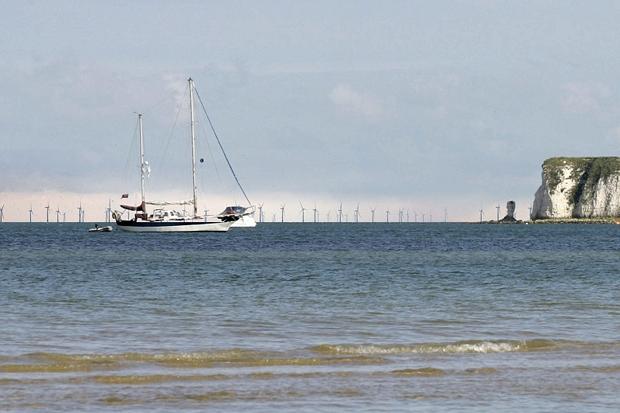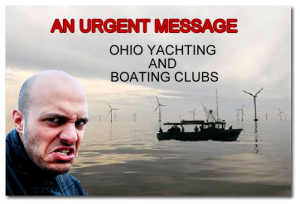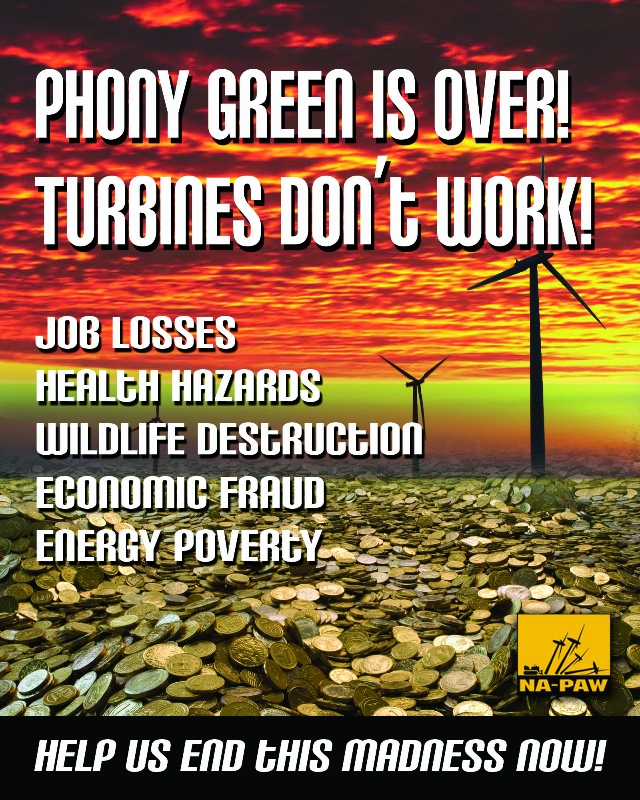The Times – 14 October 2013
Pride in our offshore wind farms is wildly misplaced. They are costlier than all other forms of energy
Here’s a short quiz. Question One: which source of energy is allowed to charge the highest price for its electricity? Question Two: which source of energy is expected to receive the greatest capital expenditure over the next seven years? The answer to both questions is offshore wind.
Offshore wind farms are the elephant in the energy debate. Today, the energy department estimates that electricity prices are 17 per cent higher as the result of green policies and that this will rise to 33 per cent by 2020 or 44 per cent if gas prices fall, as many expect. Offshore wind is the single biggest contributor to that rise. Of the £15 billion a year that the Renewable Energy Foundation thinks consumers are going to be paying in total green imposts by 2020, the bulk will go to support offshore wind.
Britain is a proud leader in offshore wind. “The UK has more offshore wind installed than the rest of the world combined and we have ambitious plans for the future,” says Ed Davey, the Energy Secretary. I wonder why that is. Could it be that other countries have looked at the technology and decided that it’s far too costly? George Osborne says he does not want Britain out ahead on green energy. He should take a long hard look at why we are so far out ahead on this extravagant folly.
Currently we get under 3 per cent of our electricity from offshore wind, or less than 0.5 per cent of our total energy. If Mr Davey’s ambitions are realised and 20 per cent of our electricity comes from offshore wind in 2020, then we will need 20 gigawatts of capacity because wind turbines, even at sea, operate at less than 40 per cent of capacity. That’s about six times what we have today and the cost of building it would be greater than the investment in nuclear energy over the period.
On the face of it, sticking wind turbines in the sea sounds like a great wheeze. There’s no need to tangle with turbulent parish councils worried about their views, or to bribe landowners with annual payments. The wind blows a little more reliably and strongly. But the engineering problems have proved daunting. Three years ago the cement grouting began to dissolve on more than half of all Europe’s offshore turbines, leading the turbines to move on their foundations. This necessitated hefty repairs and redesign. The urgency of meeting political targets was partly to blame. “There is an alarming asymmetry between construction risks and the number of players who can manage these risks effectively,” says one insider.
The Government had set a target of cutting the price it offered to pay for offshore wind power to “only” double the wholesale price, but it quietly abandoned that ambition this summer when it announced that the “strike price” for offshore wind would drop only a little. Connecting cables and transformers, dealing with corrosion, losing days to seasickness, stopping pile-driving during the season when it might upset porpoises — these have all proved more challenging than expected and have added to the costs and delays. Many in the industry think that the lifespan of a turbine in the North Sea is going to be a lot shorter than the hoped-for 25 years. One study by Gordon Hughes of Edinburgh University found that the operating efficiency of Danish offshore wind farms dropped from 39 per cent to 15 per cent after ten years. Certainly, Britain’s oldest offshore wind farm — off Blyth in Northumberland — has spent a good part of its first 12 years out of action.
It is also becoming clear that monstrous turbines are not as environmentally clean as had been imagined. Last week the £3 billion Navitus Bay wind farm, off Dorset and highly visible from the Isle of Wight, revealed that it needed 22 miles of cabling to be dug into the New Forest. Sea birds are at risk too. Pink-footed geese are apparently avoiding wind farms on migration, while songbirds are thought to be at risk of becoming confused by flashing blades while crossing the North Sea. The British Trust for Ornithology concluded that 2,603 adult and 1,056 immature gannets will be killed each year by existing and consented wind farms around the British coast. Since gannet populations are currently growing, this may not matter much, but it is a far greater toll than taken by any other industry.
And then there is the risk of an oil tanker hitting a turbine, or hitting another ship because of having been squeezed into a narrow shipping lane past a wind farm. As Lord Greenway (an Elder Brother of Trinity House) put it in the House of Lords this year, the risk of collision is increased by more than 400 per cent at some choke points and “if you place an object in the sea, either a fixed structure or a floating one, sooner or later a ship is bound to hit it”. Of course, none of these objections is fatal in itself — all economic activity entails some risks. They are however a reminder that this very expensive form of electricity is not “clean”.
Yet even the high price on offer — £155 per megawatt-hour compared with £90 for nuclear and below £50 for the typical wholesale price — may be too low to lure the investment needed if the target of 20 gigawatts of offshore power is to be met by 2020. With coal being phased out, gas restricted and onshore wind, wave, wood and water of limited capability, and even with a hugely ambitious nuclear programme, we will need some £45 billion invested in offshore wind by 2020, and another £54 billion by 2030, if the lights are to be kept on. That is considerably more than in any other energy technology, even nuclear.
Such sums are surely now unrealistic in a time when energy prices are a political hot potato. If you are sitting in the boardroom of an energy company worried about the reputational damage of putting up prices today, you must be getting cold feet about the future cost of offshore wind. Or, as a spokesman for SSE said last week: “Although we are continuing to develop offshore wind projects, it’s now also becoming increasingly hard to see how a final decision on investment in new offshore wind capacity could be made before the 2015 election.”
The defenders of renewable energy used to argue that fossil fuel prices would rise inexorably as supplies ran out, thus making even expensive offshore wind look like a bargain. Some still do —? Lord Stern made this argument to the BBC last week. But most now realise that the superabundance of shale gas and oil has postponed peak oil once again and is already driving down coal, gas and oil prices in the United States, with other parts of the world likely to follow suit. There is very little chance now of offshore wind undercutting coal or gas fired power in coming decades.
In short, Ed Miliband’s politicising of energy prices may have killed the industry he most cherishes. Soon the
energy debate will no longer be about whether offshore wind farms should or should not be built, but about how we are to fill the gap caused by the inevitable failure of the offshore wind industry to meet the capacity targets expected of it. And that’s a difficult question, given that the obvious answer — shale gas —?has just effectively been made less feasible by a new environmental rule passed by the European Parliament.
——————————————————————————————————–
COMMENTS (a few)
Bernard George 35 minutes ago
Energy policy has been driven by the naive assumption that because computers have got cheaper, wind turbines will get cheaper too if only we splurge enough money. Actually wind is a mature technology. It will always be hopelessly expensive. And since the wind is intermittent, however much we spend it will not even keep the lights on.
Forget HS2. Wind power is the maddest policy failure of our age.
James Snook 46 minutes ago
George Osborne is right. We should not be in the van of carbon reduction, expecially with subsidised wind power, where apart from all the problems that you describe, eighty percent of the capital value is imported.
Our energy policy has been driven by blind green idealism and is becoming an economic catastrophe.
Dward O’Brien 56 minutes ago
And here is what destroys our entire legal and democratic structure: “…shale gas has just effectively been made less feasible by a new environmental rule passed by the European Parliament.”
I think Matt Ridley might be overstating his case with the above quote, but I fear there will most certainly be EC interference that will put off many investors in hydraulic fracturing. This country must simply reject any such interference.
The established energy programme for the UK is not only defunct, but dangerously close to making any future plans equally useless due to their lateness while we persist with digging deeper the hole we are in. This country is literally sleep-walking towards the rationing of energy that will make wartime measures look Utopian by comparison.
Fracking, in my view, is now the only sure way that can meet demand in the time scale, in the quantity and at the right price. Out political leaders must find a way urgently to accelerate the drilling for shale gas, even to the point of over-ruling local resistance.
I wager we will be seeing power cuts within two years, if not less.
Londoner 1 hour ago
Can any member of the green lobby ever change their minds? Pro-wind goes with anti-fracking goes with anti-golden rice goes with anti-nuclear. Beliefs in this area are the enemy of rational debate
Stella Hollis 2 hours ago The ” environmental lobby ” has infected all areas of public policy. They are recipients of few votes yet by way of various politically motivated unelected groups they dominate the media from TV to Twitter. Their ” charities ” are numerous and few of them give their services free save the demo protesting youth. They are slaves to spurious climate change claims and CO2 fears.
Wind turbines are a plague produced by non science, non sense and nonentities.
Richard Marriott 2 hours ago
Who said this on 19th November 2009?
“It needs a willingness to take the argument to people about the tough choices involved in tackling climate change. This is the starting point: a willingness to engage with people on, for example, the fact that to deal with the problem of climate change, energy bills are likely to rise.”
Who said this in January 2010?
“Yes, there are upward pressures on energy bills, and that makes life difficult for people, including those in fuel poverty, but it is right that we go down the low-carbon energy route.”
Why, none other than Ed Miliband himself!
Did this excuse for a politician really understand what he was doing when he promised an economically illiterate, populist con of a future 20 month energy price freeze? What an absurd specimen he truly is!
Michael Mouse 39 minutes ago
@Richard Marriott If the tories had any nouse at all, they would plaster the entire country with billboards with those 2 quotes.
Miliband (or bandwagon), really is an industrial strength hypocrite, not to mention being blisteringly incompetent and blown this way and that by the wind. If he were ever elected, would be even more of a disaster than Hollande in France or the last Labour government.
Andrew Daws 2 hours ago
Matt, are you saying that we should never have started offshore wind farms? Surely most of the downsides could not have been predicted? The basic idea seems eminently sensible, that you harness the power from the wind rather than using up finite resources. Your argument that we should press ahead with fracking seems eminently sound, but the original decision to go into offshore wind farms sounded very good at the time.
Freddie Moran 2 hours ago
Hunterston Turbines Arrive from Denmark.
I see the bits for the the useless wind turbines at the so called “world class” SSE Offshore Turbine Testing centre have started to arrive at Hunterston by ship all the way from Esbjerg in Denmark and the Vesta fabrication / manufacturing facility – https://www.google.co.uk/search?q=esbjerg+vesta&ie=utf-8&oe=utf-8&rls=org.mozilla:en-GB:official&client=firefox-a&gws_rd=cr&ei=itY5UsWtFozVsgat94GwAQ
All we are “world class” for in Wind Turbines is blighting our landscape and a adding a significant wind turbine subsidy tax to our electricity bills to pay for this folly. All of the high skilled engineering and technical jobs associated with the design, development, manufacture, and even construction goes to either Denmark, German, or Spanish people.
Really depressing that our politicians are so stupid – they will be queuing up be at the “opening” and their pictures in the paper with these useless bits of metal and fibreglass in the background. They only need to put up with them for a few hours, us locals forever.
Myra Smith 1 hour ago
@Freddie Moran Spot on! And Salmond wants Scotland to be an independent, thriving country.Who does he think he is fooling?
PlatoSays 2 hours ago
I wish the PM would give you a job running DECC – I really do. We desperately need some common sense in energy policy and you’ve oodles of it.
Richard Marriott 2 hours ago
@PlatoSays
The Lib Dems would not allow it I’m afraid! The Conservatives in Government want to scrap the green levies, but Ed Davey (what is it about people called Ed?) won’t allow it.
At the next election, the Conservatives should promise a sensible energy strategy based on cost to the consumer and then wipe Ed Miliband’s face in his own ordure!
Iles 3 hours ago
But isn’t part of the question “what will be the cost of electricity production in 20 years?”. 150 quid for wind isn’t likely to change much. If anything I would have predicted a slight drop as the technology improves. Oil and gas powered stations are almost certainly going to double, triple over that period. Eventually, wind and nuclear will surely be cheaper.
PS When I was a kid at school we were told we would have fusion reactors in 30 years…..that was 40 years ago.
David Knox 3 hours ago
Where are the badger defenders when the pink-footed geese need them? And clearly grouting is such a serious issue we should go entirely nuclear…
PlatoSays 2 hours ago
@David Knox Grouting? I need some re-doing in my bathroom – I’d never considered asking geese.
Even Polish ones.
Neil Watts 4 hours ago
how this industry has managed to con the Government is a mystery to me. It should be throttled and NOW!
Alan Hawkes 11 hours ago
Sorry, me again. Are you sure that they are white elephants? They could be sacred cows.
Jill Allan 4 hours ago
@Alan Hawkes
……or cash cows for some?
Richard Pethybridge 5 hours ago
@Alan Hawkes Are you sure they are not just your hobby horses?
Alan Hawkes 11 hours ago
Much is made of the cost of the cost of decommissioning existing nuclear power stations. Has anyone calculated the cost of decommissioning off-shore wind turbines when they reach the end of their anticipated life? Or will they be left as derelict memorials, 21st century follies toppling one by one into the waves.
Richard Pethybridge 5 hours ago
@Alan Hawkes Miniscule in comparison – what do you suggest is done with all the highly radio-active remains of our ailing nuclear power industry? Are you in favour of burying them in a deep hole under your back garden? Mmm – thought not.
Greg Miles 13 hours ago
The French have got it right which is why we buy lots of electricity from them. Lots of Nuclear Power Stations operated as a nationally owned business.
Davey’s quixotic attempt to power an industrialised nation by wind promises to be a historic fiasco. Another major newspaper reports how ‘farms’ of diesel generators are being set up by the Grid to cover for the days when the wind does not blow.
All those resources would be far better spent on research on building safer nuclear power stations, which might even include those powered by Thorium which with an Atomic Number of 90 is slightly less radioactive than Uranium at 92, but is still radioactive enough to be a good source of power.





